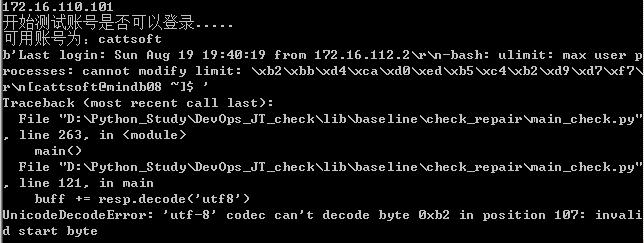接上一篇,前兩篇解決中文的問題主要是在字元集上做的手腳,即將中文轉成英文,但是有一種情況我們都來不及做轉換,即登錄時伺服器直接返回了中文內容: 此時程式報瞭如下錯誤,其實還是字元集問題: 為此:我們可以在接收數據的時候直接對其進行異常捕捉,如果異常則換一種解碼方式: 上一篇:ssh.invoke_s ...
接上一篇,前兩篇解決中文的問題主要是在字元集上做的手腳,即將中文轉成英文,但是有一種情況我們都來不及做轉換,即登錄時伺服器直接返回了中文內容:

此時程式報瞭如下錯誤,其實還是字元集問題:

為此:我們可以在接收數據的時候直接對其進行異常捕捉,如果異常則換一種解碼方式:
def verification_ssh(host,username,password,port,root_pwd,cmd): s=paramiko.SSHClient() s.load_system_host_keys() s.set_missing_host_key_policy(paramiko.AutoAddPolicy()) s.connect(hostname = host,port=int(port),username=username, password=password) if username != 'root': ssh = s.invoke_shell() time.sleep(0.1) #先判斷提示符,然後下一步在開始發送命令,這樣大部分機器就都不會出現問題 buff = '' while not buff.endswith('$ '): resp = ssh.recv(9999) try: #進行異常捕捉,如果解碼有問題,則換一種解碼方式 buff += resp.decode('utf8') except Exception as e: buff += resp.decode('gb18030') print(resp) time.sleep(0.1) print('獲取登錄後的提示符:%s' %buff) ssh.send(' export LANG=en_US.UTF-8 \n') #解決錯誤的關鍵,編碼問題 ssh.send('export LANGUAGE=en \n') ssh.send('su - \n') buff = "" while not buff.endswith('Password: '): #true resp = ssh.recv(9999) print(resp) buff +=resp.decode('utf8') print('hhhhh') print(buff) ssh.send(root_pwd) ssh.send('\n') buff = "" # n = 0 while not buff.endswith('# '): # n += 1 resp = ssh.recv(9999) print(resp) buff +=resp.decode('utf8') # print(n) # if n >=3: # break # print(buff) ssh.send('sh /tmp/check/101.sh') #放入要執行的命令 ssh.send('\n') buff = '' # m = 0 while not buff.endswith('# '): resp = ssh.recv(9999).decode() buff +=resp # m += 1 # print(m) result = buff # print(type(result)) # print(result) s.close() if __name__ == "__main__": verification_ssh('測試IP地址', '普通賬號', '普通賬號的密碼', '52222', 'root密碼', 'id')
上一篇:ssh.invoke_shell() 切換root出現的新問題
註:轉載請註明出處



